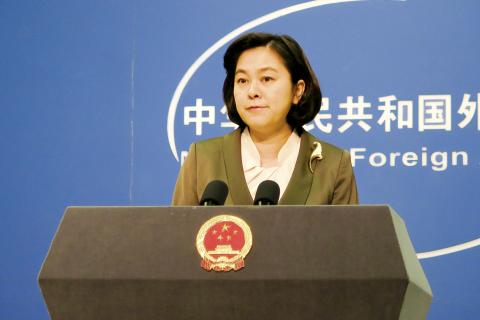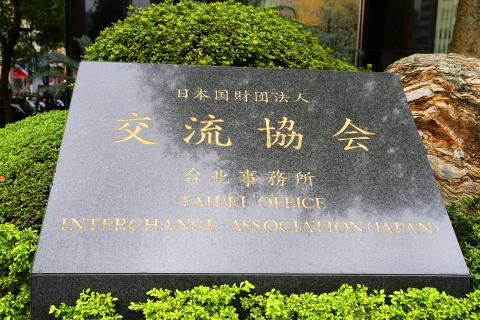The Ministry of Foreign Affairs yesterday expressed support for the planned renaming of the Interchange Association, Japan to the Japan-Taiwan Exchange Association from Sunday.
The association represents Japan’s interests in Taiwan in the absence of bilateral diplomatic ties, which ended in 1972. Taiwan also set up a de facto embassy with an ambiguous title in Tokyo, called the Association of East Asian Relations, which was renamed the Taipei Economic and Cultural Representative Office in Japan in 1992.
The ministry said that the new name reflects the business activities carried out by the association and is a positive development in Taiwan-Japan relations.

Photo: CNA
Saying that the two nations have become closer in recent years, the ministry added that Japan is Taiwan’s third-largest trade partner, while Taiwan is Japan’s fourth-largest. Bilateral trade totaled US$57.9 billion last year.
In addition, there were 5.3 million travelers between Taiwan and Japan last year and that number could surpass 6 million this year, the ministry said.
Taiwan and Japan share the universal values of democratic governance, freedom and the rule of law, with various public opinion polls showing the close and friendly relations between Taiwanese and Japanese, the ministry said, while expressing the hope that the two will continue to expand and deepen mutually beneficial cooperation.

Photo: CNA
The move could represent the greatest breakthrough since the foundation was established in 1972 after official diplomatic ties between the two nations were severed, and is expected to further Taiwan-Japan relations.
Former leader Chiang Kai-shek’s (蔣介石) administration proposed that the Japan-based association be named the Japan-China Interchange Foundation, which Tokyo rejected, anonymous sources said.
Like its Taiwanese counterpart, the then-Association of East Asian Relations, their vague appellations caused bafflement as to what their purposes were.
The sources said that the timing of the name change was because “times have changed,” which has manifested itself in several ways.
“In the 1980s and 1990s, there were not many substantial exchanges between Japan and Taiwan, but the total number of tourists visiting both nations has surpassed 6 million in recent years, and exchanges have been plentiful on a wide range of issues,” the sources said.
A recent survey by the Japanese government found that only 10 percent of Taiwanese respondents said they knew what “the functions of the Interchange Association, Japan, were, while 80 percent said the opposite, the sources said.
Association officials did not confirm if the name change signals a deepening of Taipei-Tokyo relations, but dismissed speculation that the move was inspired by US president-elect Donald Trump’s perceived stance on Taiwan, saying that it was planned, a source said.
A Japanese official said that it was “Taiwan’s business” if it changes the name of the Taipei Economic and Cultural Representative Office in Japan to the Taiwan Economic and Cultural Representative Office in Japan, but added that the potential political implications should be assessed before a change is made, the source said.
Japanese officials said that Taiwan submitted a request to change the representative office title during former representative to Japan Koh Se-kai’s (許世楷) term between 2004 and 2008, adding that the ministry has never made such a request.
“China remains firm and consistent on issues regarding Taiwan affairs. We strongly oppose any attempts at creating the frameworks of ‘one China, one Taiwan’ or ‘two China’s.’ We express our strong protest against Japan’s passive stance over Taiwan affairs,” Chinese Ministry of Foreign Affairs spokeswoman Hua Chunying (華春瑩) said at a news conference in Beijing in response to the proposed name change.
“China urges Japan to adhere to the principles set forth in the Japan-China Joint Communique and honor the promises it has made to China, uphold the ‘one China’ principle and refrain from sending false signals to Taiwan and the international community, thereby causing new problems to China-Japan relations,” she said.
China has initiated negotiations with Japan over the issue, she said.

DAREDEVIL: Honnold said it had always been a dream of his to climb Taipei 101, while a Netflix producer said the skyscraper was ‘a real icon of this country’ US climber Alex Honnold yesterday took on Taiwan’s tallest building, becoming the first person to scale Taipei 101 without a rope, harness or safety net. Hundreds of spectators gathered at the base of the 101-story skyscraper to watch Honnold, 40, embark on his daredevil feat, which was also broadcast live on Netflix. Dressed in a red T-shirt and yellow custom-made climbing shoes, Honnold swiftly moved up the southeast face of the glass and steel building. At one point, he stepped onto a platform midway up to wave down at fans and onlookers who were taking photos. People watching from inside

A Vietnamese migrant worker yesterday won NT$12 million (US$379,627) on a Lunar New Year scratch card in Kaohsiung as part of Taiwan Lottery Co’s (台灣彩券) “NT$12 Million Grand Fortune” (1200萬大吉利) game. The man was the first top-prize winner of the new game launched on Jan. 6 to mark the Lunar New Year. Three Vietnamese migrant workers visited a Taiwan Lottery shop on Xinyue Street in Kaohsiung’s Gangshan District (崗山), a store representative said. The player bought multiple tickets and, after winning nothing, held the final lottery ticket in one hand and rubbed the store’s statue of the Maitreya Buddha’s belly with the other,

‘COMMITTED TO DETERRENCE’: Washington would stand by its allies, but it can only help as much as countries help themselves, Raymond Greene said The US is committed to deterrence in the first island chain, but it should not bear the burden alone, as “freedom is not free,” American Institute in Taiwan Director Raymond Greene said in a speech at the Institute for National Defense and Security Research’s “Strengthening Resilience: Defense as the Engine of Development” seminar in Taipei yesterday. In the speech, titled “Investing Together and a Secure and Prosperous Future,” Greene highlighted the contributions of US President Donald Trump’s administration to Taiwan’s defense efforts, including the establishment of supply chains for drones and autonomous systems, offers of security assistance and the expansion of

STREAMLINED: The dedicated funding would allow the US to transfer equipment to Taiwan when needed and order upgraded replacements for stockpiles, a source said The US House of Representatives on Thursday passed a defense appropriations bill totaling US$838.7 billion, of which US$1 billion is to be allocated to reinforcing security cooperation with Taiwan and US$150 million to replace defense articles provided to the nation. These are part of the Consolidated Appropriation Act, which the US House yesterday passed with 341 votes in favor and 88 against. The act must be passed by the US Senate before Friday next week to avoid another government shutdown. The US House Committee on Appropriations on Monday unveiled the act, saying that it allocates US$1 billion for the Taiwan Security Cooperation Initiative